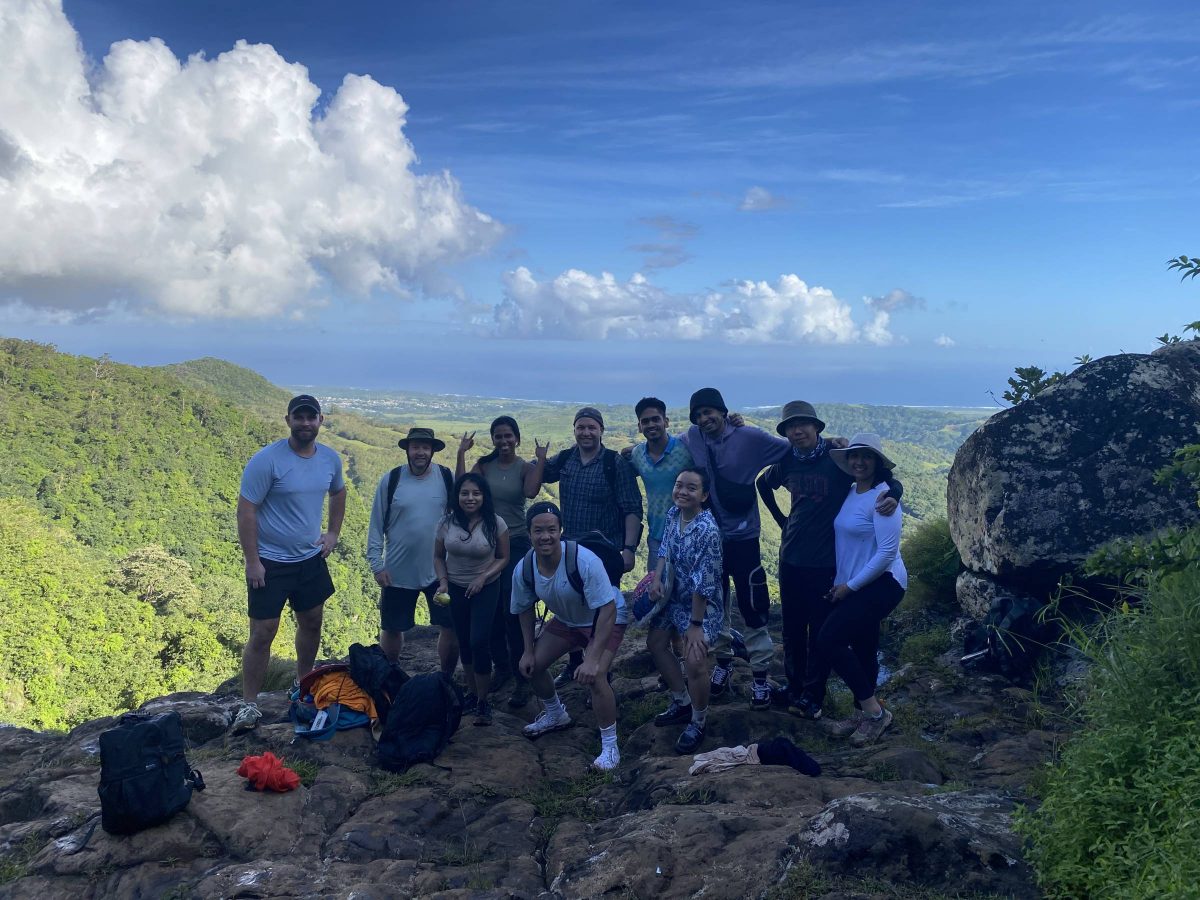
Photo by Elliot Codispodi
MBA program visits Mauritius, studies sustainability on small island nation
Asper MBA students earn credit thousands of kilometres away from the classroom
On an island less than half the size of Prince Edward Island (and former home to the dodo bird, no less), an engineer, a financial risk associate and 17 of their peers plant saplings at the Mondrain Nature Reserve, a unique way to earn credit in pursuit of their MBAs at the Asper School of Business.
From April 22 to 26, 19 Asper MBA candidates travelled to the Republic of Mauritius, an island nation about 2,000 km off the coast of Madagascar, for the annual MBA study tour.
Led by Dr. Barry Prentice, Professor of Supply Chain Management and Director of the UM Transport Institute, and Dr. Srimantoorao S. Appadoo, Department Head and Professor of Supply Chain Management, the study tour is an applied international learning excursion, where students see first-hand the challenges and opportunities of international business.
Before arriving, students spent class time learning about Mauritius—its transition from a sugarcane producer to an increasingly diversified economy, its complex telecommunications, banking and ecotourism industries and its efforts to balance economic pursuits and ecological responsibility.
They followed a packed itinerary with visits to denim manufacturer Firemount Textiles Ltd, the Economic Development Board (EDB) of Mauritius and the Bank of Mauritius Museum, as well as a two-day experience with the Mauritius Wildlife Foundation.
Students also spent a full day with Mauritius Telecom with their visit broadcast on the local news. They saw the role the organization has played in driving economic growth, investing in telecommunication infrastructure to enable businesses to thrive in a digital age.
For MBA student and engineer Elliot Codispodi, the study tour revealed the balance between preservation and progress, something that became particularly clear during a visit to the MV Wakashio oil spill site.
“We visited the site nearly four years after the spill. I have to say, as someone who has seen much of the world, this site was among the most beautiful I have ever seen. This may not have been the case if the community of Mauritian citizens and NGOs hadn’t quickly banded together to contain and clean up the spill,” he explains.
Beyond the first-hand knowledge of the country the trip facilitated, he also notes that it was an incredible opportunity to connect with his peers, professors and more.
“Experiences like this give you the opportunity to get to know your classmates and professors in a way that just isn’t possible in the classroom. Many of us didn’t know each other well but became fast friends on the trip.
“We were also given access to CEOs and key executives of some of Mauritius’ most important companies, and many of us exchanged contacts. These seeds that we planted may not bear any fruit, but you never know when these encounters can lead to life changing opportunities months, even years, down the line.”
Recent MBA alum and financial risk associate Pinaz Mehta [MBA/24] recalls the tree-planting as a highlight, also noting her interest in the unique fiscal policies and planning the country takes on as a Small Island Developing State and the opportunities for economic development that their EDB is leading.
As part of the course, students develop and present on such opportunities for an audience of local business leaders and experts. As Mehta puts it, “this project provides us with a global perspective, an understanding of diverse markets, and it allows us to develop cross-cultural competencies.”
Flash flooding interrupted students’ prepared presentations at the University of Mauritius, but with all their site visits, they still had chances to discuss these topics with leaders and community members.
Mehta, whose team prepared a presentation on airships and their potential in ecotourism in Mauritius, says that the project significantly contributed to her learning. “Such a task makes you aware of aspects you may take for granted living in Canada or how things may work differently in other countries, emphasizing context-specific problem solving.” Students saw firsthand how well their plans for economic growth fit into a Mauritian context.
As students learned during their tree-planting expedition, the conditions for growth require knowledge of the local environment and a long-term vision that pursues preservation with progress and ecological protection with economic opportunities.
—
The Asper MBA program is designed to meet the market-driven needs of today’s industry professionals. With one of the most flexible and adaptable programs in Canada, the Asper MBA program is designed to help students build their leadership skills in any field. Take the first step in transforming your career today, and learn more here.






